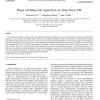Free Online Productivity Tools
i2Speak
i2Symbol
i2OCR
iTex2Img
iWeb2Print
iWeb2Shot
i2Type
iPdf2Split
iPdf2Merge
i2Bopomofo
i2Arabic
i2Style
i2Image
i2PDF
iLatex2Rtf
Sci2ools
121
click to vote
CVIU
2008
2008
Shape matching and registration by data-driven EM
In this paper, we present an efficient and robust algorithm for shape matching, registration, and detection. The task is to geometrically transform a source shape to fit a target shape. The measure of similarity is defined in terms of the amount of transformation required. The shapes are represented by sparse-point or continuous-contour representations depending on the form of the data. We formulate the problem as probabilistic inference using a generative model and the EM algorithm. But this algorithm has problems with initialization and computing the E-step. To address these problems, we define a data-driven technique (discriminative model) which makes use of shape features. This gives a hybrid algorithm which combines the generative and discriminative models. The resulting algorithm is very fast, due to the effectiveness of shape-features for solving correspondence requiring only a few iterations. We demonstrate the effectiveness of the algorithm by testing it on standard datasets,...
| Added | 10 Dec 2010 |
| Updated | 10 Dec 2010 |
| Type | Journal |
| Year | 2008 |
| Where | CVIU |
| Authors | Zhuowen Tu, Songfeng Zheng, Alan L. Yuille |
Comments (0)

